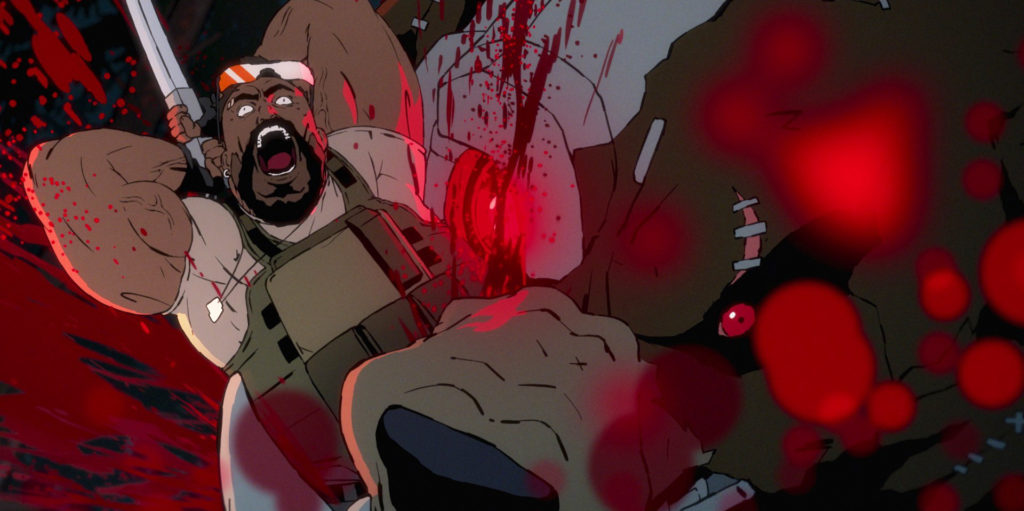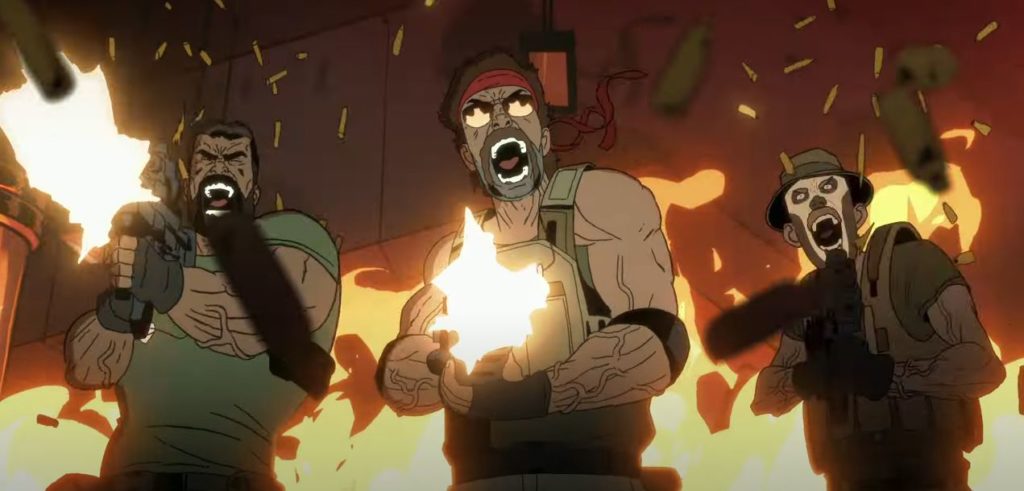Note: This essay contains spoilers for Netflix’s Love, Death & Robots, Volume 3, Episode 5.
Upon its first release in 2019, Love, Death & Robots became known for its violent, gorey, sometimes comical and encapsulating animation, with its main attraction being its unique distribution. Each volume is filled with unrelated short stories, often taken from books, theories on morality and its dystopian inspirations, and is what separates it from other releases on Netflix. Kill Team Kill is the fifth episode of Volume 3, and features a team of soldiers in the CIA trying to eliminate a top-secret, impossibly strong, genetically engineered grizzly bear in the mountains. The episode is packed with violence, foul language and an unnecessary amount of blood—tropes that are expected of the show. But what is not expected is the sheer simplicity of the episode. Love, Death & Robots usual plot twists, morality-questioning storylines, and profound writing were absent in episode five; it seemed rather bland and straightforward, and was one of the most unpopular episodes of the show. It doesn’t make you think. Upon initial viewing, one would comment that it is not thought provoking, but behind the tsunamis of blood and overdose of swear words, there may be more to analyse: Kill Team Kill is an ironic, parody-like social commentary on the male-attributed love of war and violence perpetuated by toxic ideals of masculinity.
The core of this analysis is the storyline of the episode. At surface level, the plot itself is simple enough to dissect easily, with the only thing interesting about it being the action involved. Even then, that only serves as an entertainment purpose. The film is set in the U.S., within the CIA and complete with a secret underground base—something reminiscent of most stereotypical, American-influenced and glamorized action movies. The general gist is that a special forces team, all full of muscular, ‘manly’ men, are fighting an automated grizzly bear that the CIA themselves created, a clear expression of the male gaze of violence.
There is a simplistic understanding of what is ‘good’ and ‘bad’. What that evil is and how it came about does not matter. We, the audience, just have to know that it is evil, and that the soldiers fighting are doing good and saving humanity. Nothing is directly questioned, and not even the men feel any remorse to the institution for making them fight an evil that killed them all, including the men before them. No one doubts the mission for a second; their only focus is to terminate the grizzly bear machine. The fact that they operate with no explicit mention of how the machine was created, what its purpose was and its ethical implications of it emphasises the oversimplification of action films and its real-life impact on audiences’ attitudes to, hence, very real organisations like the CIA itself.
Essentially, if one looks deeper into the plot, the CIA has sent their own people to solve a problem that they, the soldiers, never created. They sent their people, who were willing to shed their own blood for them, on a suicide mission. One can say that this is a government personality trait that, when put in the fantastical context of a film, is given little care or thought to. Pulling from Marx’s social class theory, these men are just “cogs in a machine”, little people who are crushed in the bigger production of a cover-up—a commentary on the real-life impact this has on neoliberalism in society today.
From the perspective of the audience, viewers have no care for the characters. You’re not really rooting for the soldiers; you feel no sympathy, no care for if they live or die or complete the mission. You are a passerby, watching but not really observing. Sergeant Morris dies such a gruesome death that you wouldn’t wish on your worst enemy, yet its portrayal doesn’t tug on any heart strings. There are a plethora of reasons for this: the first one being that perhaps the film is not long enough to create an emotional attachment to these characters. We barely know them; we know nothing of their past, their morals, their family—we have not an inkling of who they are. But even if we did know them, would we care?
The focus of an action film is the action. Character development and connections come secondary—used to add underlying subtext to the movie rather than become the pivot of it. Or, could it be that, with the rise of unrestricted media and genres of gore becoming more readily available to younger generations, we too are desensitised to blood, death and violence?
As a result of the relaxing of restrictions on media, modern-day movies and TV shows have become increasingly unrestrained to showing violence in regular contexts. Take the classical Hollywood era as an example: extreme violence and kissing was prohibited on-screen. Norms change over time, and what was considered unacceptable in the 1950s is now seen as normal, or even expected in action films. And it doesn’t stop there. In the name of creative freedom, boundaries are constantly being pushed, meaning that what will be considered “too violent” to show to audiences will evolve, predictably to greater lengths than they are now.
Furthermore, the desensitisation of violence is linked to the shock it provides. Shock value in the form of extreme violence attracts attention; we as humans are drawn to disturbances. Action films are primarily based on violence, and the more intense, the larger the audience. Hence, by relying on the shock value of violence to generate an audience, the boundaries of what becomes extreme or shocking are pushed beyond its potential. Gruesome brutality is featured in films which are viewed by an audience that is becoming younger and younger, constantly transforming and rewriting what it means to be violent on film. This in turn leads to the desensitisation of violence, meaning that producers have to up their game in order to gain a substantial audience.
The cycle of desensitisation and shock value of violence is a vicious, never-ending one; both of them an enemy to each other, yet pushing themselves to their limits and accentuating the audience’s role as a passerby rather than a participant.
It starts off with the soldiers taking a break from their tedious mission, and one of the characters is urinating off the mountains against a beautiful sunset. He proudly flings his genitalia around, trying to see how far he can urinate and accompanying this with loud cheers to encourage himself. Although rather strange, this is still no doubt a show of masculinity in its crudest, most animalistic form. The phallic use of male genitalia as a source of power and a way to exert dominance being portrayed in such a straightforward form is what makes this episode such a unique, direct satire of socially assigned male characteristics.
This notion is furthered in the weapons room scene, but this time it emphasises the glamourization of weapons, and the power they hold. They are a status symbol: a marker of masculinity, of dominance, and of strength. In the midst of trying to defeat the CIA’s creation, the team stumble upon an elaborate weapons room. One of the characters says: “This is where I come to jerk off.”
This is the absolute definition of what it is to be a man at its satirical best. It’s a commentary on what it means to be a man when portrayed in the media. It relates to the overuse of foul humour as a portrayal of characteristically-male things, but it also highlights the romanticization of weapons: the juxtaposition of sex and violent appeal is the crux of the male desire for power.
This unnecessary ruthlessness in the plot and detachment from characters feeds into the stereotype of fantasised male violence. The show itself, without interpretation, is highly reminiscent of typical war films, and the overvaluation of shock value diminishes the depth of plot lines in action films; they become entertainment-based, leaving an empty shell of meaning decorated with blood and gore. At surface level, it’s just a short film with a lot of blood, and in some ways, you could say that the director, Jennifer Yuh Nelson, perhaps even conformed to the genre of action for entertainment and meaningless characters. But, she is aware, and to participate in conformity with an awareness is to rebel.

